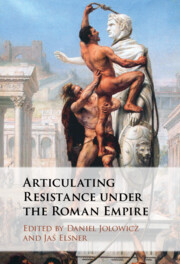Book contents
- Articulating Resistance under the Roman Empire
- Articulating Resistance under the Roman Empire
- Copyright page
- Contents
- Contributors
- Acknowledgements
- Abbreviations
- Introduction Articulating Resistance
- Part I Language and Identity
- Part II Genres of Literary Resistance
- Chapter 2 Courtroom Rhetoric in Imperial and Late Antique Philosophical Dialogues
- Chapter 3 Greek Declamation and the Art of Resistance
- Chapter 4 Plutarch’s Parallelism and Resistance
- Chapter 5 A Glitch in the Matrix
- Part III Identity Negotiation
- Part IV Religion and Resistance
- References
- Index
Chapter 3 - Greek Declamation and the Art of Resistance
from Part II - Genres of Literary Resistance
Published online by Cambridge University Press: 23 December 2022
- Articulating Resistance under the Roman Empire
- Articulating Resistance under the Roman Empire
- Copyright page
- Contents
- Contributors
- Acknowledgements
- Abbreviations
- Introduction Articulating Resistance
- Part I Language and Identity
- Part II Genres of Literary Resistance
- Chapter 2 Courtroom Rhetoric in Imperial and Late Antique Philosophical Dialogues
- Chapter 3 Greek Declamation and the Art of Resistance
- Chapter 4 Plutarch’s Parallelism and Resistance
- Chapter 5 A Glitch in the Matrix
- Part III Identity Negotiation
- Part IV Religion and Resistance
- References
- Index
Summary
In this chapter, I explore the aesthetic and cultural appeal of imperial Greek declamations that stage scenes of resistance, focussing on Polemo’s two declamations on the Battle of Marathon. I argue that in an era when ‘spectacular resistance’ (steadfast and ultimately in some sense triumphant resistance to oppression) was in vogue, as seen in the careers of figures such as Peregrinus the Cynic, Apollonius of Tyana, and early Christian martyrs, such declamations allowed elites to enjoy some of the glamour and rhetorical possibilities that spectacular resistance normally offered only to the powerless; there is a parallel here with the great play that Aelius Aristides and Polemo made of their struggles with illness. In particular, these declamations offered opportunities to indulge in the exuberant ‘Asian’ rhetorical style very fashionable at the time; moreover, artistic (rather than real) resistance allowed for the selection, full narration, and endless replay of the most attractive scenes. Finally, I suggest that the ‘controversial’ nature of the genre, in which counterarguments are always implied, and, in the case of Polemo’s duelling declamations, actually present, allowed Polemo simultaneously to present himself as in some degree superior to the trope of spectacular resistance.
Keywords
- Type
- Chapter
- Information
- Articulating Resistance under the Roman Empire , pp. 71 - 88Publisher: Cambridge University PressPrint publication year: 2023



